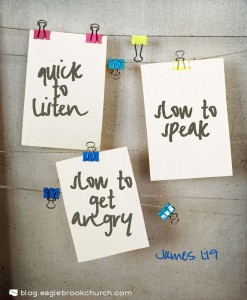Listening to be Heard
Recently I met with a couple for their very first counseling session with me. This couple sat down and immediately started bickering. As they were nitpicking over details, I found myself asking them the question, "What is it specifically that brought you in today?" After a brief moment of silence, they started to reengage in their argument. After giving them some more space to "discuss," I started hearing a pattern to their argument and it became clearer to me what was going on. So, I leaned in and asked another question, "What are you fighting for?" This one stopped them in their tracks. Although their initial answers were different, after some discussion we all came to the conclusion that they were both fighting to simply be heard. The content of the initial argument was not the point. They were trying to get their own voice to matter to their partner.
We can easily fall into the trap of not listening to people, especially people who matter the most to us. We find ourselves jumping to conclusions, being defensive, thinking about our next stinger, shutting off emotionally, or simply talking while the other is talking. Although it can seem counterintuitive to listen, the Bible is clear about the importance of it. James 1:19 reads, "Understand this, my dear brothers and sisters; You must all be quick to listen, slow to speak, and slow to get angry."

We might think we know how to listen, but do we? Really, there are two parts to listening. The first is to hear. This means don't talk. Make eye contact. Be engaged with the other person. The second is to understand. Ask questions. Desire to recognize what the other person is feeling, why they might be feeling it and if they actually need a solution.
When we practice both of those parts, it is much easier to genuinely listen and therefore validate our partner's perspective and experiences, which leads to greater trust, more communication, and better dialogue.


